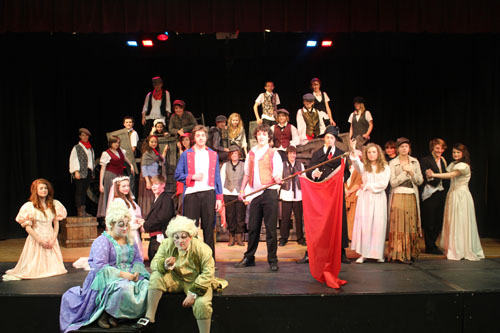
Victor Hugo's tragic story of lost time, lost love, and lost liberty is renowned for its complexity. And when adapted for the stage, that complexity is multiplied tenfold. A weaving plotline. Ambitious staging. A constant, voice-straining score. Indeed, the challenge that the musical poses is, in many cases, better known and 'appreciated' than the story itself. Yet see it once, even technically imperfect or scaled down, and any apathy you may have felt is drowned beneath the barrage of gunfire, choked in the sorrow of a lone, mournful voice, and reborn in triumphant rising chorus. It is not the stage that maketh the show.
Les Misérables owes its success - and grandeur - to Hugo's masterful storytelling. Set in 1830, the war of the classes that was the French Revolution had already been fought. But, despite the storming of the Bastille and the execution of King Louis XVI, the status quo had been reasserted. King Charles X reigned, favouring the aristocracy again. Frustrated and angered by this injustice the students, workers and poor erect barricades in the streets in protest. Against this dramatic backdrop of political unrest and rioting, some of the Les Misérables protagonists are themselves a microcosm for rebellion. Others are victims of their own innate nobility.
Jean Valjean is an ex-convict embittered by his harsh sentence and pursued by an unforgiving authority through the rest of his life. He is ready to change and be a success - he becomes a powerful factory owner and a city Mayor - but vengeful policeman, Javert, and the establishment that he represents will forever brand Valjean as simply 'Prisoner 24601'. As Hugo wrote, "Liberation is not deliverance. A convict may leave prison behind but not his sentence."
But Valjean maintains his integrity regardless. He rescues a dismissed factory worker, the beautiful but frail Fantine, from a life of scorn and poverty on the city streets, and vows to care for her illegitimate daughter, Cosette. He removes the precious, now motherless, child from the unscrupulous grasp of tavern owners, Monsieur and Madame Thénardier, and gives her the life of comfort that would otherwise have been barred to her as an illegitimate pauper.
For many admirers of the story though, it is the pitiful tale of Eponine that sounds the strongest chord. Daughter of the Thénardiers, she is worldly-wise and independent...and constantly overlooked by the handsome young man, Marius. While she harbours an unrequited love for him, she selflessly acts as Marius' go-between as he courts the gentle Cosette. So every soft whisper that he utters to Cosette threatens to extinguish the fluttering flame that Eponine shelters in her heart. But rather than allow the breath to blow it out and plunge her heart into a numb and selfish darkness, Eponine nurtures the love and lets it burn her hopes with it. All so that Marius might be happy.
It is difficult, if not impossible, to capture the plot of Les Misérables in a few short paragraphs and give a sufficient impression of the nature of its soul. For it does have a soul. It is too large to fit onto the page. It is too intricate and abstract to be encapsulated in meagre words. Perhaps that is why Hugo claimed that, "Music expresses that which cannot be put into words and that which cannot remain silent." With this view, it is obvious that his novel was destined to become a stage musical, for the emotion of Les Misérables can now be more than read; it can vibrate and resonate along every nerve and in every cell.
To thus face the prospect of staging this musical in a school is, understandably, intimidating. Overwhelming. Terrifying even. Head of Drama at St. Edmund Arrowsmith, Mr Bateman, admitted that he knew they were taking on "quite a challenge". Yet how better to celebrate the high school's Golden Jubilee than with one of the most ambitious and powerful stories to ever appear in the limelight? Indeed, 2011 commemorates the Silver Jubilee of the first London performance of Les Misérables, and so Headmaster, Mr Phillips, saw an opportunity "both to showcase the outstanding singing and acting talent within the school and to bring such memorable lyrics to an even wider audience."
Preparations began months in advance. It seemed that no sooner had the applause died and the sets been stowed away on the final night of 2010's Oliver! than the relief was chased away by a return to a high blood pressure state. January 2011 saw the Performing Arts club beginning to explore the songs and story of Hugo's masterpiece and so, by the time that auditions were being scheduled, the children were keen and the staff knew that there was a deep and rich vein of singing talent to be mined. With such a confidence in his troupe, Mr Bateman noted that "this is the time that we've got to do it." And fortunately, there was no doubt in Mr Bateman's mind that the parts had been cast perfectly: "I think all the people we had really suited the parts - physically, vocally, everything."
For a long while afterwards though, Mr Bateman's confidence waned to a sliver of hope. For rehearsals began in earnest after Easter 2010. Every night - except Fridays, of course - a mixture of shouts and chatter and the odd song echoed from the School Hall. After the summer break, the hours were extended until 5:30pm. But it was only after a Saturday rehearsal - which allowed a complete unbroken run-through of this lengthy musical - that the Head of Drama felt enough at ease to stop pacing his bedroom floor in panic late at night. Ruefully, Mr Bateman has realised that "That's the secret; you've just got realise that [the children] will get there... because the kids weren't worried!"
Indeed, it seems that most of the leading actors were imbued with an enviable youthful confidence. When speaking of the musical and their roles, many are matter-of-fact, even seemingly unaware of just what they eventually achieved. Despite seeing Les Misérables before, they were undaunted, and in fact excited, by the prospect of staging what Y11 Sophie Adamson (Fantine) dubbed "one of the best musicals in the world". No pressure then. For these youngsters, it was simply an opportunity to shine. As GCSE Performing Arts pupils, the lead actors are all passionate about singing and drama, and desperate to share this love with the world in the future, whether in lights on the West End, or in the classroom nurturing others.
However, it was the music that they admit proved the greatest challenge. Sophie was wary about performing a solo - the iconic 'I Dreamed A Dream', no less. She reminisces, "I had never really stood on a stage on my own and sung before. At first it was really scary and daunting, but after the first night I felt more relaxed." This was evident during Friday's performance, as she took centre-stage, looked up into the spotlight and sang her full-throated rendition of the sorrowful classic.
Y10 Josh Kime (Jean Valjean) was confident in his ability to carry the role of the tortured hero, especially given his experience in previous school productions, but does note that "doing an all-singing production" was a novel experience. Fellow Y10, James Desmond, was not fond of the high notes necessary in his performance of Monsieur Thénardier, but commented that a completely scored musical was actually a help to him: "Because you've got a tune as well, when you've got the tune in your head, you've got the words in your head." Ergo, less need to practice!
For Y10 Caitlin Roddy (Eponine), she felt the weight of emotion upon her shoulders. With an especially poignant storyline, she felt that her greatest personal challenge lay in "putting the right emotions into the performance, so the audience were able to sympathise". James, and Y11 Caitlin Delaney (Madame Thénardier) however, had no such qualms. Both natural comedians, they watched videos of previous professional productions, but more so to understand the story better rather than to hone their own performances; Caitlin proclaimed that she "already identified with [her] role a lot", whilst James credited his family for the advice they offered about staying in character whenever on stage.
Mr Bateman is keen not to neglect mention of the rest of the cast though. "The rest of the cast was brilliant because they turned up for every rehearsal and put their heart and soul into it, even though they didn't have the biggest parts...So it was a real team effort." Y8 pupil, Regan Osborne, certainly proved himself invaluable when he stepped into the breach as the Gavroche understudy. Doing a "tremendous" job, he turned out to be "quite a little find" as he covered for a voiceless Callum Stridgeon. Consequently, although Callum had recovered in time for the performances, Regan was credited for his efforts and took to the stage in front of an audience also.
Technically, the show was the most complex that the school has ever staged. Sixteen radio microphones were in use at once. There were smoke machines, gunshots and explosions, and an overhead display. Bringing these technical considerations together with the props, set, costume changes, musical overlays and the acting, was Mr Bateman's greatest challenge. Together, he and Assistant Head of Department, Miss Moynihan, had to wrangle a group of people that extended beyond the already large cast for hours at a time.
Nevertheless, with a musical like Les Misérables, it is Mrs Morgan, Head of Music, that Mr Bateman showers with his most effusive praise and nominates as his unsung hero. "She didn't get one moment when she wasn't playing" and thus it is almost miraculous that she maintained such intense concentration for over two hours. Undoubtedly, she will also be relieved by Mr Bateman's suggestion that next year's school production be a far more modest affair of perhaps a musical revue. Not only will it benefit the health of staff, but hopefully be fun, happy, and give more of the pupils a chance in that spotlight.
I Dreamed A Dream: A Personal Review
Les Misérables had never appealed. To my uneducated mind, it was a depressing political musical with operatic pretensions. It sufficed to know the chorus of one or two songs and to be able to do the sharp intake of breath at the ambition and courage of cast and crew. "That must be so difficult," I'd commiserate. I seemed to understand the scope of the undertaking. But that did not make me eager to see the eventual triumph. On Friday 14th October, I took my place in the audience with half my heart flicking through a mental TV guide to look up what entertainment I was sacrificing.
I knew that an undeniable amount of effort and resources had been invested into this year's school production. Large dramatic sets, sumptuous costumes, and a dozen replica muskets were hired to save the hands of the Technology and Art Departments. Stagehands and Performing Arts technicians had dedicated just as much time to rehearsals for a smaller piece of the limelight. Make-up and hair was practiced until every strand fell perfectly and every line on the casts' faces was drawn place-perfect. And the hoarse voices of the leading actors were testament to the hours of rehearsal, both singing and acting. Yet would it all be enough to sway my preconceptions of Victor Hugo's story?
Of course it was. As Mr Phillips proudly proclaimed afterwards, "For pupils between the ages of 11 and 15 to present such high-class entertainment is testament to their obvious ability". Les Misérables is certainly a difficult story to grasp. The lengthy time-scale, multitude of characters, political connotations and surprisingly dark abstract themes are challenging for young minds to follow, let alone convey. The music is varied and demanding for tender voices. Yet all of the pupils involved immersed themselves into the world of Les Misérables and were evidently determined to prove their worth alongside their Broadway and West End predecessors.
It was the score especially that showcased the pupils' talents for it is unquestionable that there is power in the music of the show. Chords alone, sympathetic to the action on stage, can lend an emotional gravitas to a scene not quite understood by its words alone. It was helped by the simply purity of Y10 Maddie Hudson's (Cosette) sweetly pitched voice, and Sophie Adamson's assured and measured delivery. So, during St. Edmund Arrowsmith's production, there were two particular occasions that made my spine tingle and my heart swell with pride in these young adults. Firstly, the verbal clash between Josh Kime as Valjean and Tom Loughlin as Javert. Two young men with strong evocative voices competed repeatedly in a battle of lyrics and notes, each harmonising and contrasting and rising in volume in order to beat the other down. In this vocal rivalry - and its accompanying defiant stances and glares - the two talented Y10 pupils displayed an enmity that did not only stem from their characters' senses of honour, duty and injustice, but their contempt for and confusion at the other's perspective and ideology.
In contrast, Caitlin Roddy's performance of 'On My Own' as Eponine created a more intimate and sorrowful atmosphere. A famous song from the tragic musical, I have heard 'On My Own' countless times before. As such, I credit Caitlin herself on drawing out my emotional response, for never have I heard the words sound more genuine and pitiful. In her delivery, beating at her chest, this young woman made the plight of Eponine a noble and selfless counterpoint to the grand backdrop of revolution, and thus her eventual death in Marius' arms all the more poignant.
It is such performances that revived my imagination and my engagement with the musical as a whole. For all its drama, Les Misérables does take its toll upon the average audience member; there is a surprising amount of effort required to concentrate through an entirely scored production. While it would be easy to blame this fatigue on poor stage action or a need to decode unclear lyrics, that would be impossible. The pupils at St. Edmund Arrowsmith emoted believably and sang with impassioned clarity. So, I must blame their brilliant performances instead; the actors' earnestness and characters' constant strife was unrelenting. Already exhausted by Eponine's death and the fall of the barricades, Sam Bullock's rendition of 'Empty Chairs at Empty Tables' was the metaphorical salt in the wound; another, deeper ache after I had thought the worst was over.
Fortunately, welcome comic relief was on hand in the marvellous Monsieur and Madame Thénardier. Y10 pupil, James Desmond, returned to tread the boards and illicit stolen chuckles from the audience members as the dastardly tavern owner, following his well-received performance as Mr Bumble in the previous year's Oliver! His foil and wife, played by Y11 Caitlin Delaney, proved an equally sharp wit, and both shone even in the background. Never were they out of character, and when front and centre they ensured that a hundred pairs of eyes followed their every nudge and wink. A certain amount of brazenness was especially necessary on Friday night as they delivered the bawdy humour with sneaky glances toward Chair of Governors, Reverend O'Brien, sat in the front row...
Mr Phillips has long been a fan of Les Misérables, praising its contrasts in musical style and tone, and thus its ability to evoke the tumultuous period of history. When pressed to choose a favourite part, it is with reluctance that he nominates the ensemble pieces of 'Red and Black' and 'Do You Hear The People Sing?' He says: "I find it very difficult to imagine how anyone could fail to be encouraged by the sheer force of the music. When I reflect that these scenes follow the brilliant comic performances of the Thénardiers, it is hard to think of another musical which has so much variety, such a range of emotions, and such excellent lyrics and music." Hopefully then, he appreciated the defiance shown by his pupils as they took to the barricades, firing their muskets with a fervour that had the technician manning the smoke machine working vigorously.
And so, as I drove home, it was a rather indescribable set of emotions that accompanied me on the passenger seat. Pride, without a doubt. I found my head nodding appreciatively, quietly impressed that the seemingly impossible had been achieved. And while I hummed 'Master of the House' and drummed its rhythm upon the steering wheel, it was more than the lyrics and melody that had seeped into my memory. Something had taken hold. I had a strange desire to see the show again. It was not, as I had supposed, incredibly depressing; no, it had been forlorn. It was not pretentious; rather, it was stirring. I had believed every word of the young people I had seen on that stage. To me, they had suffered. They had felt the injustice, the hatred, the vengeance and guilt. They had been 'Les Misérables' and in this case, there is no greater compliment to give. And three nights of standing ovations proved it.
(1).png)
.png)












